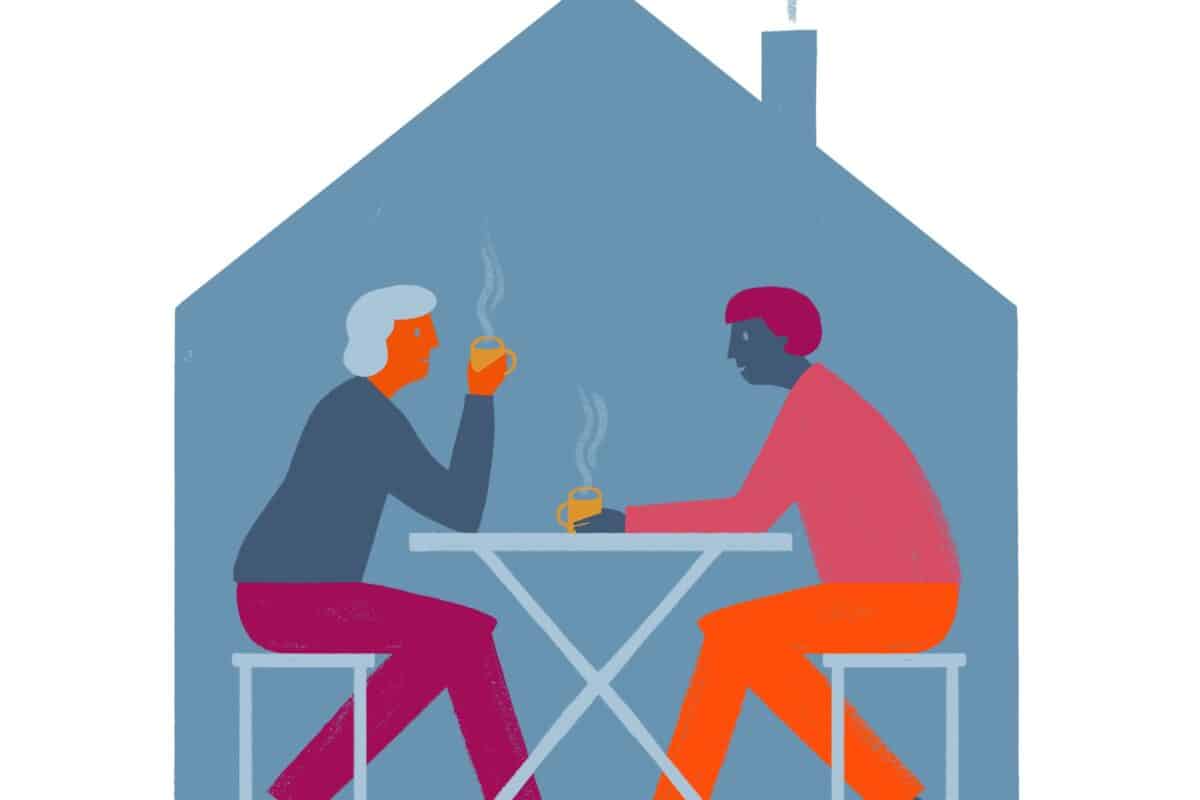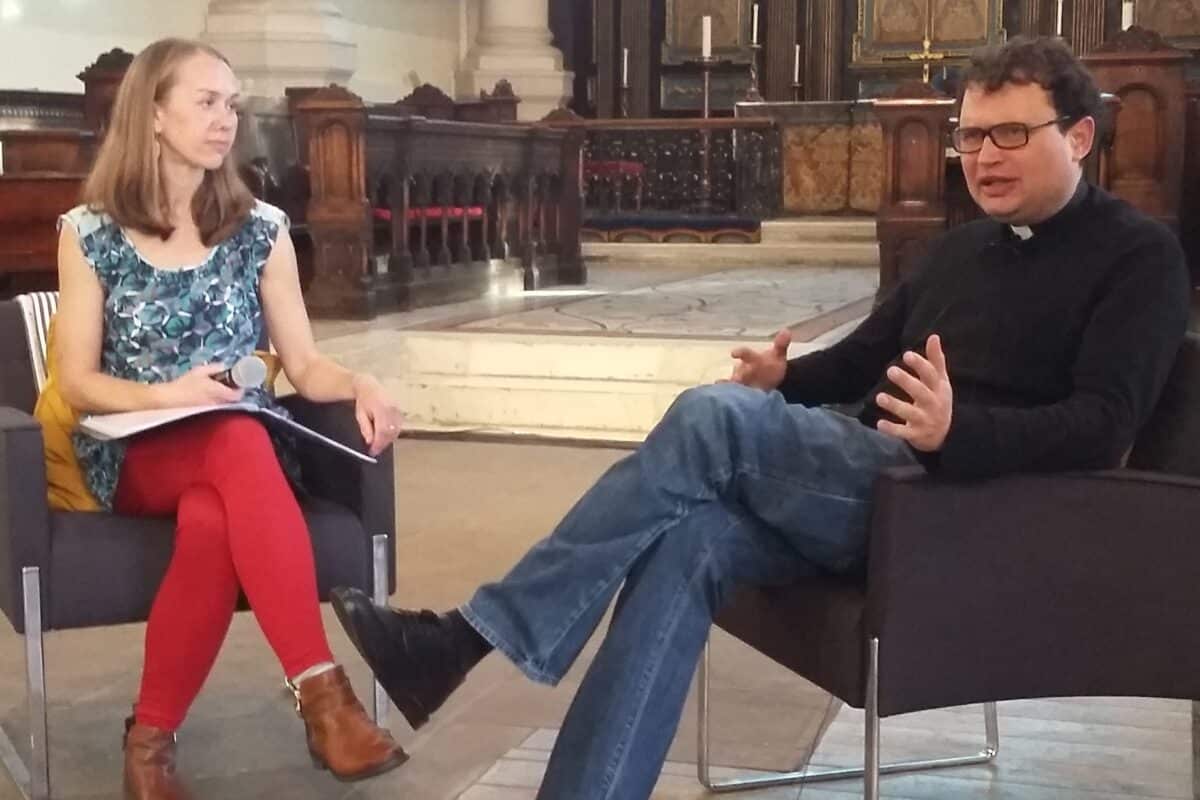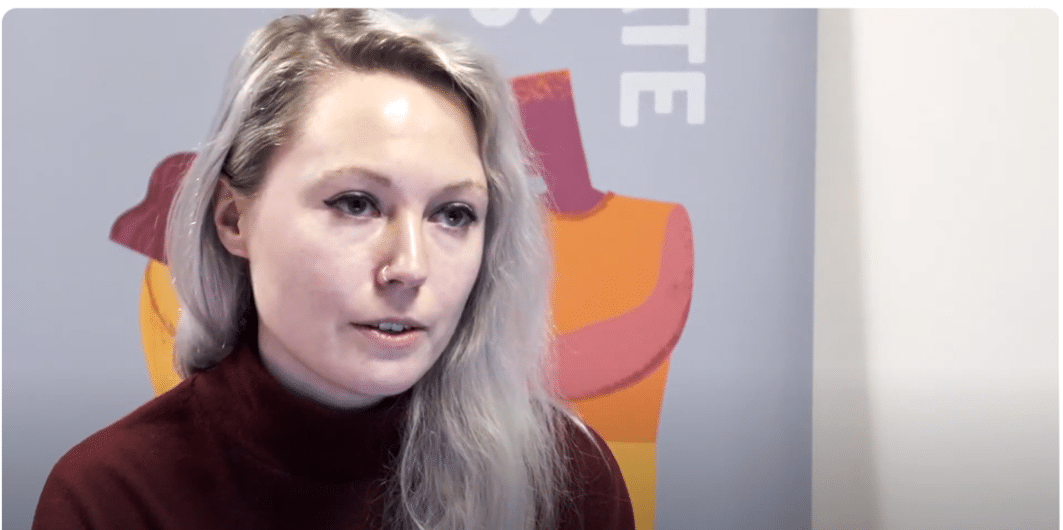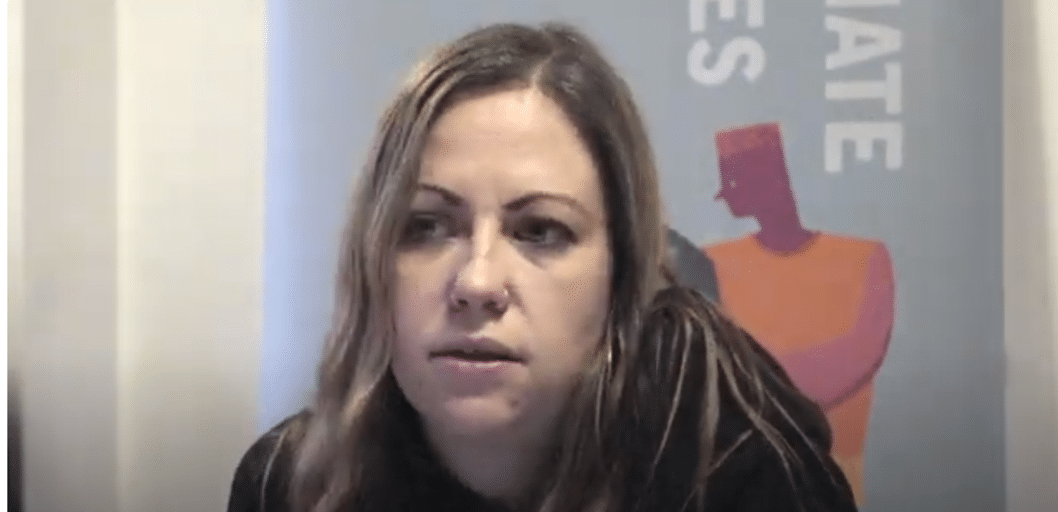Your hospitality can change someone’s life
Do you have a spare room that you could offer to a homeless asylum-seeker, refugee or other migrant in need?
The Diocese of London work in partnership with the charity Housing Justice to provide temporary accommodation for London’s destitute asylum-seekers, refugees and other forced migrants, while they resolve their immigration status.
Hosts provide invaluable respite for people who have come to the UK, often fleeing persecution or war, and have then been forced into destitution by a hostile immigration system.
When did we see you as a stranger and invite you in?
Matthew 25.38
Keep reading to learn more, or click on the button below to express your interest in becoming a host.
Hosting offers a practical and supported way for anyone within Diocese of London to provide the safety and stability such people urgently need.
You do not need to be a member of clergy to become a host, you just need to live in London and have a spare room.
Hosting with Housing Justice has the support of the Bishops in the Diocese of London together with the Diocesan Registry, Safeguarding and Property Teams.
Latest video resources on hosting
Being a host simply means opening up your home to somebody in need – somebody who has been through a lot and has nowhere else to turn.
Receiving a guest into your home is a unique, humbling and deeply enriching experience.
Guests are referred to Housing Justice by recognised agencies and then hosts are invited to offer hospitality in their season of need.
Hosts and guests are fully supported throughout.
You can choose to host for a few weeks, a few months or longer.
Hosting is like inviting any other guest to stay in your house: we do not expect professional support to be offered, simply a place to stay, facilities to wash and somewhere to cook and eat.
One guest who received their refugee status shares this about their hosting experience:
“The hosting project has made a really big difference to my life, more than I can say in words. I’ll never forget it.
Before this I was sleeping on the streets for six years. When I was finally able to stay in a house I couldn’t believe it. It was like a dream.
I didn’t go to church when I was sleeping rough because I was self-conscious about my appearance and hygiene; I didn’t think the other people would want me there or to be near me. Now I go to church regularly, and I am proud that I am taking care of myself and feel much more confident. I feel like a different person.”
Hosting posters- File Downloads
Frequently asked questions on clergy hosting
Hosting is like inviting any other guest to stay in your house. We are not asking for professional support to be offered, simply a place to stay, facilities to wash and somewhere to cook and eat. These and your offer of friendship will go a long way.
Hosting requires very little time from you compared to other ways you might support asylum seekers. It can be a great option for people who want to help but are already busy.
There is some time involved initially when getting set up to host, but these steps will be arranged around your schedule. Once you have a guest staying with you, the time commitment is minimal. It is very possible to fit hosting into a busy life, and if you know you are unlikely to have much time to spend with your guest, Housing Justice will match you with someone happy to be independent.
You can register your interest here and someone from Housing Justice will be in contact with further information. They will then send you an application form which can be returned via email. They will contact you to arrange an assessment in your home which is also a chance for you to meet us in person and ask any more questions.
Housing Justice will work with you on your terms as long as the basic principles of the project are agreed between you. They will arrange a DBS check for all adults in your household, and provide you with an induction training session and our host handbook before you start. Once this has been completed, they will be able to make you an offer of hosting, according to your availability.
The Housing Justice Hosting Project provides accommodation for destitute asylum seekers and other forced migrants with no recourse to public funds. Normally this means those who are preparing a fresh asylum claim or other application for leave to remain in the UK, and who have lost their entitlement to support and accommodation and are not allowed to work.
Hosting gives an invaluable opportunity for solicitors and migrant support agencies to work on cases and stabilize clients, so that they are able to resolve their case so that the right to live and work in the UK is granted to them.
Guests are referred to Housing Justice Hosting by advisers and caseworkers from homelessness and migrant support agencies operating in London. No self-referral is possible. We will give you information about the guest before you meet them and we will take into account your preferences and lifestyle when ‘matching’ a guest with you.
People with a current drug or alcohol addiction, history of violence or criminal behaviour, severe mental or physical health needs, will not be referred through hosting. We may accept referrals for guests with less serious physical or mental health (e.g. depression) needs if we have hosts who are confident in dealing with these issues. If you have such qualifications and/or experience and are willing to host such guests, please indicate this clearly on the application form.
We work hard to match hosts and guests, as well as possible. We will give you as much information about your prospective guest as we can prior to matching you. Some guests will interact a lot with the host, others prefer to spend more time alone or with their friends outside the home. If an insurmountable problem arises, then the guest will be moved elsewhere. You are not contractually obligated.
You could download the posters on this webpage and display one in your church/ hall to let those in your church community know about hosting with Housing Justice.
You can also contact us at the Compassionate Communities Team if you would like someone to come and speak in your context about hosting with Housing Justice.
Yes, and the Diocesan Registry has approved the campaign. The hosting scheme has the backing of our Bishops and the property department of the Diocese of London.
With hosting, the focus is on people who have no recourse to public funds who are not able to access support from anywhere else. Guests of the Hosting with Housing Justice scheme aren’t allowed to work, can’t receive mainstream benefits and can’t access mainstream services for homeless people. If they didn’t have a friend to stay with, they would often be on the street, except when they are able to access church winter night shelters for the months they open. This is different to the situation of British nationals who find themselves homeless in the UK. Therefore although housing issues make life exceptionally difficult for everyone, there are unique challenges for asylum seekers and other destitute migrants who are barred from the support to which ‘locals’ are entitled.
Also, many of the guests who enter the hosting project have been in London for many years, living here in ‘limbo’ because unable to resolve their immigration status. They have become part of a local community and they are trying to resolve their immigration issue so they can finally be even more involved: able to work, rent, study, and contribute to the area around them.
Theologically, the understanding of loving our neighbour is both a local and global command. Hosting with Housing Justice is one part of the wider efforts by churches to love all our neighbours, both indigenous and foreign (Leviticus 19:34, 1 Peter 4:9).
Of course! Please complete the short enquiry form here and someone from Housing Justice will be in touch.
Every host who becomes part of the Housing Justice Hosting scheme will receive support, and have the opportunity to participate in group sessions and online training where available.
- Induction: online induction session – understand what resources and support are available; be prepared for common scenarios in hosting; increased confidence to start hosting; opportunity to ask questions. The Hosting team will remain in regular contact with you and you will have an out of hours mobile phone number and email address to use in case of emergency.
- Information: our Host Handbook that includes a list of resources for you and/or your guest to do during the day, ESOL and other educational resources, health facilities, advice agencies, as well as community and refugee support groups.
- Training: from time to time, we are offered online and in-person training on relevant topics, which we would make available according to need and interest from hosts.
- Reflective Practice: meet other hosts and reflect on your experiences, share your joys and concerns. Find out new ways of doing things, services that can help you help your guest.
- Administrative support: Housing Justice Hosting takes responsibility for all admin duties related to the project as well as Disclosure and Barring service (DBS) application and payment for adult host household members.
Yes! Many families find that hosting is great with children. We can help you think through the things you need to consider and answer any specific questions you might have about this.
You indicate the time you want to host in the application form and we take it into account when we arrange a placement. With most guests, we ask that hosts can offer them a room for three months at least as this gives them much-needed stability. However, if you are only able to host for a short time please still get in touch, as we do occasionally need short-term placements, e.g. as respite for long-term hosts. After the first three months, we would review any placement and if both the host and guest are happy to continue, it can be extended, up to twelve months. Hosts can also contact Housing Justice staff to end the placement at any time.
We do not have funds to support hosts therefore we request that you do not incur any expenses which you would not have incurred otherwise. Some hosts may be able to provide meals, others not. Either is fine and will be discussed at the host visit and any matching meetings with prospective guests. The guest should not ask you for money and this will be made clear to them when the placement is arranged. Financial and material assistance will be made available for guests so they can have some independence whilst living with you. They should therefore be able to buy basic food and toiletries as well as travel around as needed.
As a minimum, we expect that the guest will be provided with a place to sleep (ideally a room but it may be a sofa bed in the living room), bedding and towel, place to store and cook food and a place to keep their belongings and to wash their clothes. General conduct and safety rules for staying in somebody’s house will be explained to the guest at the introductory meeting, but please make them aware of any specific requirements you may have regarding coming and going, use of kitchen, bathroom, etc.
You do not have to if you prefer not to. You may decide to do so after you have had a chance to get to know your guest better. However, if you do not give your guest the use of the key, it is important to make arrangements on when they are expected to leave the house and come back.
No. The guest will have a dedicated and qualified caseworker who will continue working on their case while they are hosted by you; giving immigration advice is illegal unless you are registered with the Office of the Immigration Services Commission (OISC) and may place both you and your guest at risk.
Yes, Housing Justice will arrange this, and the Diocesan Safeguarding team are supportive of the project.
There are many other ways that you can help to meet the needs of refugees, asylum seekers and destitute migrants. Take a look at the Compassionate Communities’ Webpage [insert link to new page] for ideas or email us at compassionate.communities@london.anglican.org to explore this further.
Each guest receives £25 a week either from their referral agency or the Housing Justice destitution fund. If your church community is able to provide this support for your guest, it means that the Housing Justice destitution fund can help another guest. Other churches provide a ‘welcome box’ for a guest including an Oyster Card, toiletries and essential items. If you’d like to talk about this more or have other suggestions, you can contact Housing Justice.
All our guests are referred to us by support agencies who know them and their needs. If they require counselling or help to deal with trauma, they will usually be already receiving this help by the time they start being hosted.
We don’t accept guests onto the hosting scheme who have high additional support needs and who will place an additional burden on the host. However, if it becomes obvious that your guest has additional needs that are not currently being met, please get in touch with Housing Justice staff who will then liaise with the referral agency to work out how best to help the guest. If it is no longer appropriate for the guest to be hosted, they will be referred elsewhere.
Would you like to take the next step to explore hosting?
You can click here to register your interest in becoming a host, and you will be contacted by Ella Gosling or Jenna Roberts at Housing Justice for an introductory conversation about hosting.
For more information about the Housing Justice Hosting Project, you can click here.
To discuss other ways you can support refugees and asylum seekers, you can contact the Compassionate Communities Team.



